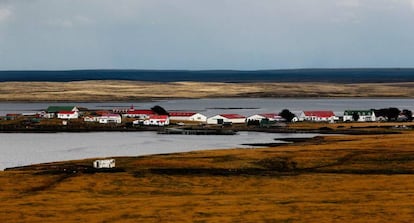Theresa May seeks new approach to Falklands Islands dispute
Downing Street looks to leave past behind and begin a new era in relations that would lead to lifting of restrictions to carry out oil exploration in South Atlantic

In her first official contact with the Argentinean government, British Prime Minister Theresa May has written to President Mauricio Macri calling for a normalization of relations over the Falkland Islands that would include more flights to the British-run territory, as well as a lifting of restrictions on oil exploration.
May, who took office on July 13, expressed her “sincere hope” in the letter, sent on Thursday, of improving relations with Argentina, which have been strained since the 1982 war between the two countries after the military junta ruling the country at the time decided to invade the Falkland Islands.
Downing Street believes that it can rebuild a more fruitful relationship with Macri, who took office in December, in contrast with the bitter exchanges between May’s predecessor, David Cameron, and Macri’s forerunner, Cristina Fernández de Kirchner.
May called for "more productive" relations between the two countries in her letter to the pro-business Macri, who took office in December as Argentina's first non-Peronist president in more than a decade.
We have an issue with the United Kingdom over the Falkland Islands...without denying its existence, we can work on many other things while we gradually advance toward a resolution of this issue Argentine foreign minister Susana Malcorra
"Since the election of President Macri, we have been working towards improved relations with Argentina because we think that is in the interests of both our countries and the Falkland Islanders too," May's Downing Street office said in a statement.
In her letter, May said she hoped that where the two countries had differences, "these can be acknowledged in an atmosphere of mutual respect". She called for progress towards new flights between the islands, which are located about 435 miles off the coast of Tierra del Fuego in southern Argentina, and third countries in the region.
As things stand, a Chilean airline flies from Santiago to the Falklands every Saturday via the southern Chilean city of Punta Arenas. Once a month, the flight also stops in Rio Gallegos, Argentina, in both directions.
May also called for the removal of "restrictive hydrocarbons measures", a reference to various attempts by Argentine authorities to restrict oil and gas exploration in the waters around the islands. Tensions flared in June last year, under Macri's predecessor Cristina Fernandez, when an Argentine federal judge ordered the seizure of millions of dollars' worth of assets owned by drillers operating in the Falklands area. The Argentine measures have not halted oil exploration, although efforts have been scaled down in recent times due to low oil prices on international markets.
Susana Malcorra, Argentina’s foreign minister, responded to the letter, telling media that President Macri would look at the British proposals. The new Argentinean president has said he intends to improve and strengthen relations with the United Kingdom, ending the confrontational approach that characterized the Kirchner administration.
Sign up for our newsletter
EL PAÍS English Edition has launched a weekly newsletter. Sign up today to receive a selection of our best stories in your inbox every Saturday morning. For full details about how to subscribe, click here
“We believe it is very important to reestablish dialogue at the highest level between our two countries, as President Macri and Prime Minister David Cameron did, because we continue to believe, as we have said all along, that the links between Argentina and the United Kingdom are an important part of our presence in the world. We have an issue with the United Kingdom over the Falkland Islands, a subject that is part of our Constitution, so without denying its existence, we can work on many other things while we gradually advance toward a resolution of this issue.”
The Falklands have a population of about 3,000 people, the overwhelming majority of whom say they wish the islands to remain a British overseas territory.
Argentina has rejected that argument, accusing Britain of deliberately settling people there over a long period of history to bolster an illegitimate sovereignty claim.
English version by Nick Lyne.
Tu suscripción se está usando en otro dispositivo
¿Quieres añadir otro usuario a tu suscripción?
Si continúas leyendo en este dispositivo, no se podrá leer en el otro.
FlechaTu suscripción se está usando en otro dispositivo y solo puedes acceder a EL PAÍS desde un dispositivo a la vez.
Si quieres compartir tu cuenta, cambia tu suscripción a la modalidad Premium, así podrás añadir otro usuario. Cada uno accederá con su propia cuenta de email, lo que os permitirá personalizar vuestra experiencia en EL PAÍS.
¿Tienes una suscripción de empresa? Accede aquí para contratar más cuentas.
En el caso de no saber quién está usando tu cuenta, te recomendamos cambiar tu contraseña aquí.
Si decides continuar compartiendo tu cuenta, este mensaje se mostrará en tu dispositivo y en el de la otra persona que está usando tu cuenta de forma indefinida, afectando a tu experiencia de lectura. Puedes consultar aquí los términos y condiciones de la suscripción digital.








































